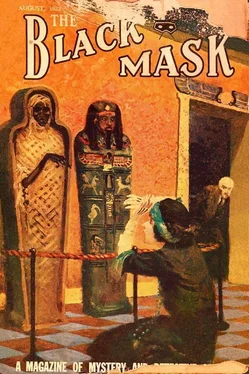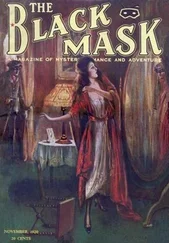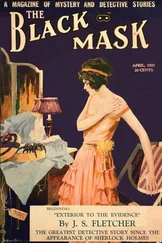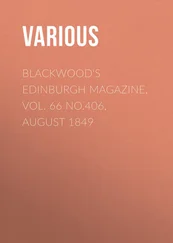John Baer - The Black Mask Magazine (Vol. 5, No. 5 — August 1922)
Здесь есть возможность читать онлайн «John Baer - The Black Mask Magazine (Vol. 5, No. 5 — August 1922)» весь текст электронной книги совершенно бесплатно (целиком полную версию без сокращений). В некоторых случаях можно слушать аудио, скачать через торрент в формате fb2 и присутствует краткое содержание. Город: New York, Год выпуска: 1922, Издательство: Pro-Distributors Publishing Company, Жанр: Детектив, на английском языке. Описание произведения, (предисловие) а так же отзывы посетителей доступны на портале библиотеки ЛибКат.
- Название:The Black Mask Magazine (Vol. 5, No. 5 — August 1922)
- Автор:
- Издательство:Pro-Distributors Publishing Company
- Жанр:
- Год:1922
- Город:New York
- ISBN:нет данных
- Рейтинг книги:4 / 5. Голосов: 1
-
Избранное:Добавить в избранное
- Отзывы:
-
Ваша оценка:
- 80
- 1
- 2
- 3
- 4
- 5
The Black Mask Magazine (Vol. 5, No. 5 — August 1922): краткое содержание, описание и аннотация
Предлагаем к чтению аннотацию, описание, краткое содержание или предисловие (зависит от того, что написал сам автор книги «The Black Mask Magazine (Vol. 5, No. 5 — August 1922)»). Если вы не нашли необходимую информацию о книге — напишите в комментариях, мы постараемся отыскать её.
The Black Mask Magazine (Vol. 5, No. 5 — August 1922) — читать онлайн бесплатно полную книгу (весь текст) целиком
Ниже представлен текст книги, разбитый по страницам. Система сохранения места последней прочитанной страницы, позволяет с удобством читать онлайн бесплатно книгу «The Black Mask Magazine (Vol. 5, No. 5 — August 1922)», без необходимости каждый раз заново искать на чём Вы остановились. Поставьте закладку, и сможете в любой момент перейти на страницу, на которой закончили чтение.
Интервал:
Закладка:
The detective leaned back in his chair and lighted his pipe before he answered.
“Simplest thing in the world, Mr. Wines. He drew out his account twice, that’s all. Once at noon, when Dykes was at the window, and a little later when Hackett got back from lunch. You see,” he continued, “he was probably about ready to quit — a game like he was playing can’t go on forever — and when he read that little article in the paper this morning he figured his day’s work was done. And if I hadn’t interfered,” he added, “the bank would have been short nine thousand, permanently.”
“What makes you think that,” Wines inquired.
“Because it’s a hundred to one bet that you’d have never even suspected Esseltine of the crooked work.”
“With two of his checks in our hands, both of them drawing out his entire balance?” Wines sneered. “You fail to give us credit for even average intelligence, Mr. Cheever. Why, we’d have had the wires hot all over the United States within an hour after the bank closed its doors tonight.”
“Provided you had two checks,” Cheever said quietly.
“Why, what do you mean?” the banker exclaimed excitedly. “Didn’t you say that he cashed one with Dykes and one with Hackett? When did one plus one cease to be two?”
“Mr. Wines,” Cheever grinned cheerfully. “Your arithmetic is above par, but the simple fact remains that you now, at this present writing, have but one check for five thousand dollars signed by Gabriel Esseltine. And now don’t go into apoplexy just yet,” he advised the banker, “but listen a moment while I propound a simple question to Hackett here.”
“Hackett,” said he, “a man carrying an account with this bank cashes a check at your window for one hundred dollars. Now suppose you lose that check in the course of the day, where would you be at night?”
“A hundred dollars short, of course,” Hackett answered promptly, “but there’s so little chance—”
“I said suppose you do lose it?” the detective cut in. “You’d be short, wouldn’t you?”
Hackett nodded, dimly conscious that back of this simple question lay a whole realm of mystery which this calm-faced man had already explored.
Then with startling suddenness he turned to President Wines.
“Let me see that check I gave you for safe keeping,” he demanded.
Mechanically the banker arose, unlocked an inconspicuous drawer in his private desk and reached within, then turned about slowly, empty fingers working spasmodically.
“It’s gone,” he croaked.
“ ‘Where the woodbine twineth,’ ” Cheever quoted softly. He sat there a moment before he continued:
“Naturally you want to know how I unraveled this thing. Now you’ll remember that I took the checks which passed through Hackett’s window and lined them up on that table in the directors’ room. And, Mr. Wines, you’ll recall that when I left the room at noon Saturday, to get a drink, I locked the door after me?”
Wines nodded his remembrance.
“Well, when I came back not more than ten minutes later, I found that one of the checks had disappeared.”
The President started to ask a question at this point but Cheever forestalled it.
“Wait a moment,” he protested. “A careful and thorough search proved conclusively that it was not in the room. Now the door being in plain sight, I discarded it as a probable means of entrance, but I did find that this window here, which leads into the directors’ room, was unlatched.”
“Some employee then,” Wines exclaimed, but the detective again cut him off.
“I think that is the conclusion the average man would come to,” he said enigmatically, “and there was but one bit of evidence, a tiny rift of ashes on the spot left vacant by the removal of the check.”
Abruptly he turned to Hackett.
“Ever notice any ashes mixed up in your checks?” he asked sharply.
“No — yes, I have too!” the teller fairly stuttered in his excitement.
“Mr. Cheever,” Wines said with finality, “the employees of the bank are not allowed to smoke in the building, so—”
“Where there’s ashes there’s fire,” the detective assured him dryly. “Now that little drift of ashes on the table interested me. I collected it carefully, and Sunday spent some anxious moments over it. Of course a novice can tell pipe ashes from cigarette ashes—”
“Which was it?” Wines cut in eagerly.
“Mr. Wines, it was neither.”
“Neither?” the banker echoed.
Cheever leaned nearer.
“Not tobacco ashes at all, Mr. Wines, but the ash left when paper is eaten up with certain chemicals! You see it now of course. Esseltine cashed with you, among his others, some checks treated with powerful chemicals, whose mutual reaction was so timed that in a brief while, at least within an hour, the check literally disappeared. Hayes and I tried the mixture at his office just before I came back this afternoon and it’s odorless and colorless, with absolutely no sensation of heat or cold. It was certainly uncanny to sit there and watch a piece of paper disappear before your eyes. That explains the losses at Hackett’s window. Esseltine cashed checks that were converted into ghosts of checks in short order.”
“But Dykes and I by comparing notes likely would have remembered an amount as large as five thousand dollars,” Hackett remarked. “He could hardly have got away.”
“My guess is that he would,” Cheever replied. “His flivver was at the office, and also a grip well packed with disguises and clothes, mostly workingmen’s stuff. We found that his hair was false, in reality he’s as bald as a cook, and he’s not as fat as he pretends. A lot of that’s padding! And of course he’d have treated himself first of all to a shave. At the least he’d have been out of here three hours before you’d have fixed on him as guilty and three hours is a long time for a man of his shrewdness. I think not many small-town marshals would have picked up a smooth-faced, bald-headed, not over-fat man in greasy overalls and denominated him as Gabriel Esseltine. No, Mr. Hackett, give him an hour’s start even, and Gabriel would have been on his way.”
Cheever glanced at his watch and knocking the ashes from his pipe got leisurely to his feet.
“I’ve got about half an hour to pack my collarbox and hit a train for Chicago,” he remarked.
At the office door he paused.
“A dealer in phantoms, I’d call Esseltine,” he chuckled. “The old boy is certainly there with bells. So long.”
The Vault
by Murray Leinster
I
The window slid up easily — too easily — and Mike waited a long time, listening, before he made a move. The whole huge pile of the factory was still. There were no lights anywhere, except that dim one by the gate through the stockade. Lying quite still in the darkness, Mike waited. There was no sound, no ringing of alarm bells, no bustle of activity anywhere. The manufacturing plant of the Whitney Jewelry & Watch Company remained as it had been before, a vast, still pile of brick, with empty-eyed windows staring blankly at the night.
And yet... That window had opened very easily. Mike meditated, his little eyes gleaming in the darkness. Then he saw a tiny flicker of light in the distance. The window he had opened was at the end of a long corridor, and he saw the watchman walking unhurriedly away from him. The watchman’s legs threw monstrous shadows from the lantern he carried, Mike could not see his face, but he could see the uniform and note the absolute leisure and confidence with which the man was moving. He paused, as Mike watched, and inserted his key in a watchman’s clock. He turned it, registering his presence and vigilance on a strip of paper within the mechanism. Then, casually, he went on his way. In a few moments he turned a corner and was lost to sight.
Читать дальшеИнтервал:
Закладка:
Похожие книги на «The Black Mask Magazine (Vol. 5, No. 5 — August 1922)»
Представляем Вашему вниманию похожие книги на «The Black Mask Magazine (Vol. 5, No. 5 — August 1922)» списком для выбора. Мы отобрали схожую по названию и смыслу литературу в надежде предоставить читателям больше вариантов отыскать новые, интересные, ещё непрочитанные произведения.
Обсуждение, отзывы о книге «The Black Mask Magazine (Vol. 5, No. 5 — August 1922)» и просто собственные мнения читателей. Оставьте ваши комментарии, напишите, что Вы думаете о произведении, его смысле или главных героях. Укажите что конкретно понравилось, а что нет, и почему Вы так считаете.












